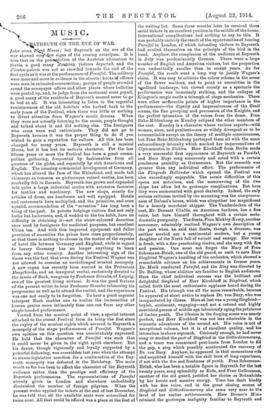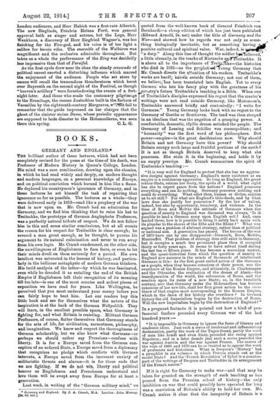MU SIC.
AYREIITH ON THE EVE OF WAR.
Inter arma s nt Musae ; but Bayreuth on the eve of the war showed verfAew signs of the coming cataclysm. It is true that on the preistion of the Austrian ultimatum to Sonia a good many Jraistrian. visitors departed, and the Fiirsten-galerie was not so crowded' -towards the end of the first cycle as it was at the performance of Pars ifid, The military were more and more in evidence in the streets : knots a officers were seen in animated conversation; groups of people cioirded round the newspaper offices and other places where bulletins were posted up, and, to judge from the nocturnal votes populi, a good many of the residents of Bayreuth seemed never to go to bed at all. It was interesting to listen to the regretful reminiscences of the old habitues who harked back to the early years of the Festival, when there was little or nothing to divert attention from Wagner's music dramas. When they were not actually listening to the music, people thought and talked about it and did nothing else. The foreigners who came were real enthusiasts. They did not go to Bayreuth because it was the proper thing to do if you wished to gain a reputation for culture. All this has been changed for many years. Bayreuth is still a musical Mecca, but it has lost its esoteric character. For the last fifteen years or more the Festival has been a great cosmo- politan gathering, frequented by fashionables from all quarters of the globe, and especially by rich Americans and English. The amazing commercial development of Germany, which has altered the face of the Rhineland, and made tall chimneys as common as picturesque ruined castles, has been markedly felt in Bavaria. Bayreuth has grown and expanded into quite a large industrial centre with extensive factories for textiles and machinery. The new shops, mostly for articles of dress, are handsome and well equipped. Hotels and restaurants have multiplied, and the primitive, and even squalid, accommodation of the " seventies " has long been a thing of the past. In private lodgings visitors find not only baths but bathrooms, and, if wedded to the tea habit, have no difficulty in obtaining it—not the straw-coloured decoction once used by foreigners for medicinal purposes, but excellent China tea. And with this improved equipment and fuller provision of amenities the prices have risen proportionately, so that there is nothing to choose in the matter of the expense of hotel life between Germany and England, while in regard to luxury Germany has no longer anything to learn from any other country. Another interesting sign of the times was the fact that even during the Festival Wagner was not allowed to exercise an unchallenged musical monopoly. A new organ has recently been erected in the Protestant Hauptkirche, and an inaugural recital, exclusively devoted to the music of Bach, was given by Professor Straube, of Leipzig, one of the greatest living virtuosi. It was the good fortune of the present writer to bear Professor Straube rehearsing his programme as well as to attend the recital, and the experience was one not easily to be forgotten. To hear a great organist interpret Bach enables one to realize the immensities of human genius more intimately than one can from any other single-handed performance.
Viewed from the musical point of view, a special interest attached to the recent Festival from its being the first since the expiry of the musical rights which secured to Bayreuth a monopoly of the stage performances of Parsifal. Wagner's own opinion on this question was unmistakably expressed. He held that the character of Parsifal was such that it could never be given in the right spirit elsewhere. But Lis desire, though vigorously and loyally supported by a powerful following, was overridden last year when the attempt to secure legislative sanction for a continuation of the Bay- reuth monopoly was defeated in the Reichstag. The main result so far bas been to affect the character of the Bayreuth audience rather than the prestige and efficiency of the Bayreuth performances. The representations of Parsifal already given in London and elsewhere undoubtedly diminished the number of foreign pilgrims. When the present writer applied for tickets at the end of last December, lie was told that all the available seats were subscribed for twice over. All that could be offered was a place at the foot of the waiting list. Some three months later he received three serial tickets in an excellent position in the middle of the house. International complications had nothing to say to this. It was probably entirely the result of the opportunities of hearing Parsifal in London, of which intending visitors to Bayreuth had availed themselves on the principle of the bird in the hand. Anyhow, the complexion of the audience at Bayreuth in July was predominantly German. There were a large number of English and American visitors, but the proportion was undoubtedly smaller than in recent years. As for Parsifal, the result went a long way to justify Wagner's claim. It was easy to criticize the colour scheme in the scene of the flower maidens, and to point to unrealities in the zodland landscape, but viewed merely as a spectacle the perfornaance was immensely striking, and the collapse of Klingsor's magic castle a triumph of stage mechanics. There were other meihorable points of higher importance in the performance—the dignity and impressiveness of the Grail scenes, the fine grouping and procession of the Knights, and the perfect intonation of the voices from the dome. Fran Bahr-Mildenburg as Kundry eclipsed the other members of the cast. Kundry is a character whose various aspects—wild woman, siren, and penitent—are so widely divergent as to be irreconcilable except on the theory of multiple consciousness, but Fran Bahr-Mildenburg portrayed them all with the same extraordinary intensity which marked her impersonations of Clytemnestra in Elekira. Herr Kirchhoff from Berlin made a very successful first appearance at Bayreuth as Parsifal, and Herr Mayr sang sonorously and acted with a certain ponderous geniality as Gurnemanz. But the ensemble was greater than any individual effort. The performance of the Fliegende Hollander which opened the Festival was also exceedingly enjoyable. The scenic, difficulties of this opera are notorious, and the manceuvring of the two ships has often led to grotesque complications. But here they were surmounted with great dexterity. Indeed, the only serious criticism invited by the mounting was the sumptuous- ness of Deland's house, which was altogether too magnificent for a homely merchant skipper. The Vanderdecken of the cast, Mr. Bennett Challis, an American baritone, has a fine voice, but bore himself throughout with a certain melo- dramatic pomposity. The Senta, Fran Miekley-Kemp, another newcomer, admirably realized Wagner's own description of the part when he said that Senta, though a dreamer, was neither morbid nor a sentimental modern, but a young daughter of the North full of naivete and energy. Her voice is fresh, with a fine penetrating timbre, and she sang with fire and passion. One must not forget the Mary of Fran Schumann-Heink, one of the old guard, or omit to note Herr Siegfried Wagner's handling of the orchestra, which showed a remarkable advance on his achievements in former years. Dr. Muck conducted Parsifal, and the Bing was directed by Dr. Balling, whose abilities are familiar to English audiences. Here the chief individual success was the brilliant and delightful Siegfried of Herr Kirchhoff in Siegfried, which called forth the most enthusiastic applause heard during the Festival. His triumph was all the more remarkable, because be appeared at short notice to replace Dr. von Bary, who was incapacitated by illness. Here at last was a young Siegfried— boyish, exuberant, engaging—and not a rotund and highly nourished person of middle age laboriously aping the petulance of limber youth. The illusion in the forging scene was nearly perfect, and Herr Kirchhoff was not less admirable in the romantic adventures of the second act. His voice is not of exceptional volume, but it is of excellent quality, and his intonation is above reproach. Curiously enough, be had never sung or studied the part of Siegfried in the Gotterdammerung, and a tenor was summoned post-haste from London to fill the gap, a step which possibly accelerated the recovery of Dr. von Bary. Anyhow, he appeared in that momentous rots and acquitted himself with the skill born of long experience, if not with the fire and freshness of youth. Frau Schumann- Heink, who has been a notable figure in Bayreuth for the last twenty years, sang splendidly as Erda, and Fran Gulbranson, another of the old guard, justified her choice as Briinnhilde by her heroic and massive energy. Time has dealt kindly with her fine voice, and in the great closing scenes of Siegfried and Getterdammerung she came very near to tl:e level of her earlier achievements. Herr Breuer's Mime retained the grotesque malignity familiar to Bayreuth and London audiences, and Herr Habich was a first-rate Alberich. The new Sieglinde, Fraulein Helena Forti, won general approval both as singer and actress, but the Loge, Herr Wenkhaus, a discovery of Herr Siegfried Wagner's, was too finicking for the Fire-god, and his voice is of too light a calibre for heroic roles. The ensemble of the Walkiiren was magnificent and the orchestra admirable throughout. But taken as a whole the performance of the Bing was decidedly less impressive than that of Parsifal.
As the first cycle drew near its close the steady crescendo of political unrest exerted a. disturbing influence which marred the enjoyment of the audience. People who set store by omens will recall the tremendous thunderstorm which burst over Bayreuth on the second night of the Festival, as though "heaven's artillery" were foreshadowing the events of a fort- night later. And those who made the customary pilgrirer.ge to the Eremitage, the rococo Lustsclaoss built in the fashion of -Versailles by the eighteenth-century Margraves, vr;KIVIit fail to remember that the guide impressed on her chirges that the ghost of the sinister weisse Dame, whose periodic appearances are supposed to bode disaster to the Hohenzollerns, was seen



































 Previous page
Previous page